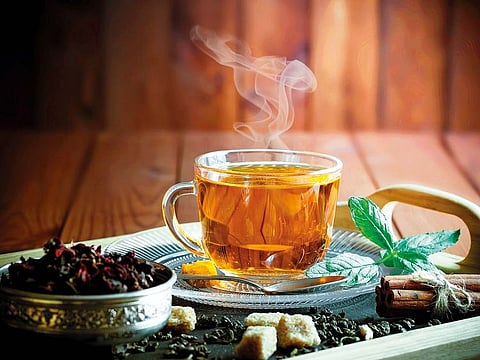A healthy sip
How tea can be part of your diet during Ramadan

Tea has been an integral part of cultures from all over the world. In the Middle East, tea is a symbol of hospitality, bringing people together, while the good, old-fashioned high tea has been part of the British food scene for centuries.
Besides, being a cultural marker, the beverage has also been linked to an array of health benefits, such as improved cognitive power and immunity and reduced stress levels, blood pressure and cholesterol.
Tea contains high levels of polyphenols, which have anti-inflammatory and antioxidative properties.

“Tea contains high levels of polyphenols, which have anti-inflammatory and antioxidative properties,” says Dr Dana Al Shaka’a, clinical dietician at American Hospital, Dubai.
Teas of all kinds can slow down the process of ageing and help cells regenerate and repair, points out Zenia Menon, nutritionist at Dubai Herbal and Treatment Centre (DHTC). “Tea also helps to lower the levels of stress hormone, cortisol, easing irritability, headaches, insomnia and tension. Since tea contains less caffeine than coffee, it also helps create a calm but active state of mind.”
During Ramadan, have tea during iftar and suhour to rehydrate and enjoy its health benefits. However, too much of tea can lead to adverse effects.
Tea also helps to lower the levels of stress hormone, cortisol, easing irritability, headaches, insomnia and tension.

For a healthy Ramadan
“The caffeine level in a particular tea depends on the brew. Limit your intake of tea to 2-3 cups a day during Ramadan, as excess caffeine leads to dehydration” warns Dr Al Shaka’a. “Have white or green tea, as these are less fermented and contain lower amounts of caffeine.”
Menon recommends drinking green tea, chamomile tea, fennel tea or ginger tea during iftar and suhour. “Chamomile tea has relaxing properties, which aids in sleep, and fennel and ginger tea can help reduce bloating and aid in digestion after meals,” she explains.
Tea for weight loss
Green tea is known for its weight-loss properties. “While it can increase metabolism and improve insulin levels due to the flavonoid catechin, it must be taken in combination with a diet plan for greater weight loss effects,” Menon explains.
“The effects of green tea are likely to be small in comparison with other weight loss methods such as exercise and diet. People who are eating a balanced meal for iftar and suhour can incorporate green tea into their diet, as long as they don’t overindulge in it.”
3 tea spots to try
Tea Way
Located in Jumeirah 2 on the main road, Tea Way is known for serving some of the best karak chais in town.The strong flavours of cardamom, ginger, and cinnamon dominate this popular beverage.
Karak House
Occupying a prime spot in the Downtown area in Dubai, this restaurant offers a variety of Arabic-Indian fusion cuisine along with its signature drink, homegrown Emirati-style karak chai.
Chai Street
This is a quaint spot in Sharjah’s Al Majaz area with a menu featuring a variety of teas including ginger and saffron along with a variety of burgers, sandwiches and desserts.


